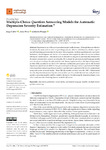Multiple-Choice Question Answering Models for Automatic Depression Severity Estimation

Use este enlace para citar
http://hdl.handle.net/2183/29372Coleccións
- Investigación (FIC) [1672]
Metadatos
Mostrar o rexistro completo do ítemTítulo
Multiple-Choice Question Answering Models for Automatic Depression Severity EstimationData
2021Cita bibliográfica
Gabín, J.; Pérez, A.; Parapar, J. Multiple-Choice Question Answering Models for Automatic Depression Severity Estimation. Eng. Proc. 2021, 7, 23. https://doi.org/10.3390/engproc2021007023
Resumo
[Abstract] Depression is one of the most prevalent mental health diseases. Although there are effective treatments, the main problem relies on providing early and effective risk detection. Medical experts use self-reporting questionnaires to elaborate their diagnosis, but these questionnaires have some limitations. Social stigmas and the lack of awareness often negatively affect the success of these self-report questionnaires. This article aims to describe techniques to automatically estimate the depression severity from users on social media. We explored the use of pre-trained language models over the subject’s writings. We addressed the task “Measuring the Severity of the Signs of Depression” of eRisk 2020, an initiative in the CLEF Conference. In this task, participants have to fill the Beck Depression Questionnaire (BDI-II). Our proposal explores the application of pre-trained Multiple-Choice Question Answering (MCQA) models to predict user’s answers to the BDI-II questionnaire using their posts on social media. These MCQA models are built over the BERT (Bidirectional Encoder Representations from Transformers) architecture. Our results showed that multiple-choice question answering models could be a suitable alternative for estimating the depression degree, even when small amounts of training data are available (20 users).
Palabras chave
Depression prediction
Social media
Pre-trained language models
Multiple-choice question answering
Social media
Pre-trained language models
Multiple-choice question answering
Descrición
Presented at the 4th XoveTIC Conference, A Coruña, Spain, 7–8 October 2021.
Versión do editor
Dereitos
Atribución 3.0 España






